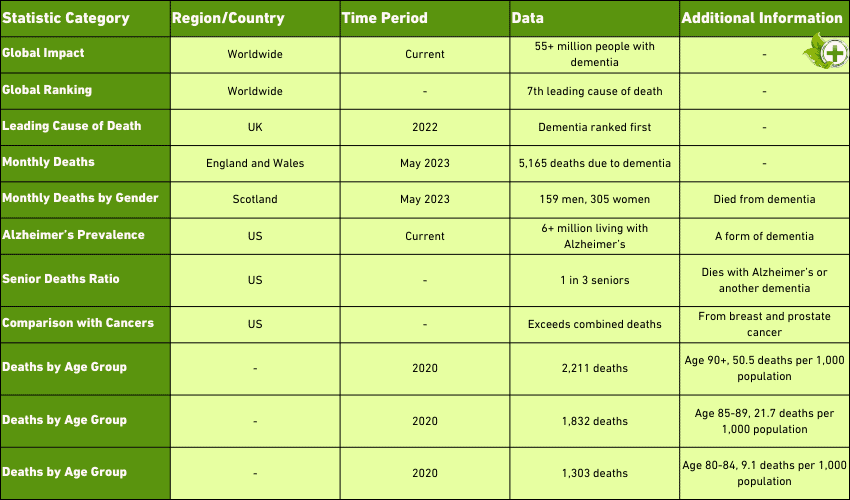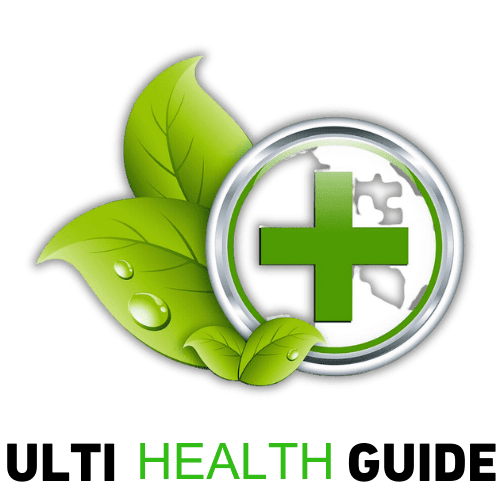Quick Reference
Does Dementia Kill You?
While dementia itself doesn't kill you, it can lead to serious health complications that lead to death. For example, those with dementia will be at increased risk of falling or developing infections.
What Is Dementia?
Dementia is a general term that describes the decline in mental ability due to disease or injury. It affects different people in different ways and can cause a wide range of symptoms, including memory loss, confusion, problems with language, trouble with abstract thinking, and impaired judgment.
What Causes Dementia?
- Alzheimer's disease
- Vascular dementia
- Lewy body dementia
- Frontotemporal dementia
- Creutzfeldt-Jakob disease
Causes Of Dementia Symptoms
- Anxiety
- Depression
- Delirium
Signs And Symptoms of Dementia
- Memory loss
- Problems with thinking and reasoning
- Problems with communication and language
- Difficulty with planning and organizing
- Difficulty with coordination and motor skills
- Acting impulsively
- Mood swings and changes in behavior
- Hallucinating or experiencing delusions or paranoia
How Does Dementia Kill You?
- Accidents
- Infections
- Serious Illnesses
- Dementia Itself
- Dehydration
- Malnutrition
How to Reduce The Risk Of Death of Dementia Patients
- Provide Proper Medical Care
- Provide a Safe Environment
- Monitor Their Health
Dementia has become among the most common causes of death in developed nations. In 2017, dementia was the cause of death for about 66.7 people per 100,000 U.S. standard population. So, why does dementia kill you?
Dementia can kill you in several ways. The most common cause of death from dementia is pneumonia, which is a severe lung infection. It can kill you in several other ways, which we will explore later in this blog. Why do dementia patients die eventually? Let's explore some of the reasons first.
What is dementia?
Dementia includes symptoms that affect thinking, memory, and reasoning, and it can be caused by various conditions like Alzheimer's disease and vascular dementia. These two are the most common, making up 60-80% of all dementia cases. [1]
In 2017, the National Vital Statistics reported 66.7 deaths per 100,000 people in the U.S. due to dementia, which was over 30% higher than in 2000.[2]
According to WHO, dementia is now one of the top ten causes of death in the U.S., and globally, it rose to the seventh leading cause of death in 2019, up from 11th in 2000. People with dementia typically live 4-8 years after diagnosis. If you know someone with dementia, consider reading top-rated books on the topic to learn how to care for them better. [3] [4]

What causes dementia?
Dementia happens when different conditions harm or kill brain cells. This damage stops the cells from talking to each other well. Because of this, the person has trouble thinking, remembering things, and behaving normally.
The most common causes of dementia are Alzheimer's disease and vascular dementia. Other causes include Lewy body dementia, frontotemporal dementia, and Creutzfeldt-Jakob disease.
- Alzheimer's disease is the most common dementia type, accounting for 60-80% of cases. It is a degenerative disease that attacks the brain's nerve cells or neurons. This damage causes the neurons to die, which results in memory loss and other cognitive problems.[5]
- Vascular dementia is the second most common dementia type, accounting for 20-30% of cases. This is caused by an obtrusion in blood flow to the brain, which results in reduced blood supply. This decrease in blood flow can lead to problems with thinking, memory, and coordination. [6]
- Lewy body dementia is the third most prevalent dementia type, accounting for 10-15% of cases. It is caused by the buildup of Lewy bodies in the brain. Lewy bodies are clumps of protein that damage neurons. This damage leads to problems with thinking, memory, and behavior. [7]
- Frontotemporal dementia is the fourth most common type of dementia, accounting for 5-10% of cases. It's a result of brain damage to the frontal and temporal lobes. This damage leads to problems with thinking, behavior, and personality. [8]
- Creutzfeldt-Jakob disease is another fatal disease that can lead to dementia. It is a rare, degenerative brain disorder caused by the buildup of abnormal proteins in the brain. This buildup leads to problems with thinking, movement, and behavior. [9]
- In addition, certain medical conditions such as stress, anxiety, Depression, and delirium can cause dementia symptoms. The same article says rare conditions like Creutzfeldt-Jakob disease, Huntington's disease, Chronic traumatic encephalopathy, and HIV can also lead to dementia. [10]

Signs and symptoms of dementia
Dementia symptoms can vary depending on the type of dementia a person has. However, some common symptoms are associated with all kinds of dementia. [11] Common symptoms of dementia include:
- Memory loss
- Problems with thinking and reasoning
- Problems with communication and language
- Difficulty with planning and organizing
- Difficulty with coordination and motor skills
- Acting impulsively
- Mood swings and changes in behavior
- Hallucinating or experiencing delusions or paranoia
Most of these symptoms appear in the early stages of dementia and become more severe in the final stages. If you or someone else shows these signs, it's important to diagnose dementia quickly. Finding it early can help slow the disease and make the person's life better.
Note: Crippling anxiety is a prevalent issue among individuals with dementia, exacerbating symptoms, especially those impacting attention and decision-making. This emotional turmoil is notably prevalent in patients with preserved awareness of their condition, leading to heightened anxiety levels. Vascular or frontotemporal dementia (FTD) patients often face this challenge, while it's less common in Alzheimer’s sufferers.
Does dementia kill you?
Dementia itself doesn't cause death. But, it can make a person's physical and mental skills get worse, as a study shows. This can make the person more likely to fall, have accidents, or get infections. These problems can lead to death. [12]
How does dementia kill you?

Accidents
Dementia can lead to accidents and falls. People with dementia are nearly two times more likely to fall than those without it. To lower the number of falls, it's important to find and manage the risks.[13]
Sometimes, a person with mild dementia might forget they need help walking and try to walk alone, leading to a fall.
Falls can lead to serious injuries like broken bones and head injuries, and can sometimes be deadly. Since older adults face a high risk of getting hurt or dying from falls, preventing them is crucial. For people with dementia, making their surroundings safer, helping them when they walk, and encouraging exercise can be helpful.
Since dementia affects everyone differently, talking to a healthcare expert to make a personalized plan to prevent falls is essential.
Infections
- Pneumonia
Dementia can increase the risk of infections. People with dementia are more likely to get infections than those without it. There’s a link between having dementia and being hospitalized for pneumonia. [14]
Pneumonia is a dangerous lung infection that can affect anyone but is more common in older people. So, it’s key to try to prevent pneumonia in people with dementia.
Ways to prevent pneumonia include getting vaccinated, joining pneumonia prevention programs, and following steps to control infections. Dementia affects each person differently. So, it’s important to talk to a doctor to make a personal plan to prevent pneumonia.
- Urinary tract infections
Dementia can increase the risk of urinary tract infections (UTIs). People with dementia get UTIs more often. Half of them might end up in the emergency room because of a UTI. [15]
UTIs can cause fever, the need to pee often, and not being able to hold in pee. If not treated, UTIs can turn into a dangerous infection called sepsis. But to prevent UTIs, it helps to stay clean, treat symptoms quickly, and sometimes use preventive antibiotics.
- Bed sores
People with dementia can get bed sores, and these can be very dangerous. Bed sores often happen to people with dementia. Those with serious dementia and bed sores don’t live as long. They also often have low levels of hemoglobin and serum albumin, showing they aren’t eating well. [16]
To avoid bed sores, it’s important to take good care of the skin, eat well, and drink enough water. Wearing loose clothes and moving the person often to avoid pressure on the skin can also help.
Serious illnesses
- Heart disease
Dementia can lead to serious illnesses like heart disease. People with dementia are twice as likely to get heart disease. [17]
Heart disease is a top killer in the U.S. It can lead to heart attacks or strokes. So, it’s important to try to prevent it in people with dementia.
Eating healthy and exercising can help prevent heart disease. Medicines like statins can also help.
- Diabetes
Dementia can be linked to diabetes. People with diabetes are more likely to get dementia. Diabetes can make the risk of thinking problems and dementia higher. [18] [19]
Diabetes is a serious illness that can cause heart disease, stroke, and kidney failure. So, it’s key to try to prevent diabetes in people with dementia.
Eating healthy and regular exercise can help stop diabetes. Medicines like metformin can also help.
Did You Know? Gut microbiota plays a significant role in developing diabetes, obesity, cancer, and cardiovascular disease, as stated in the article Does Alcohol Kill Gut Bacteria? So, keeping your gut health is essential for preventing these chronic diseases.
- Covid-19
Dementia can increase the risk of getting and dying from Covid-19. People with dementia are more likely to catch Covid-19. A study of over 61.9 million adults showed that those with dementia had higher death and hospital stay rates than those without it. [20] [21]
Covid-19 is a serious lung illness that can cause pneumonia and breathing failure. So, it’s important to protect people with dementia from Covid-19.
To prevent Covid-19, getting a flu shot, washing hands often, and staying away from sick people can help. Wearing a mask and keeping distance from others is also important.
Dementia itself
If not treated, dementia can get worse and lead to death. It affects the brain and body, making thinking and moving harder. People with advanced dementia can lose all brain function and can't take care of themselves.
There’s no cure for dementia and no sure way to stop it. But, some things can slow it down. Eating healthy, exercising, and certain medicines like cholinesterase inhibitors can help.
Other Causes
- Dehydration
Dementia can make dehydration more dangerous. Older adults often face dehydration, and it’s riskier for those with dementia.
Dehydration can make thinking and moving harder. It can also lead to serious issues like kidney failure and sepsis. So, it’s key to keep people with dementia from getting dehydrated. [22]
Drinking lots of liquids, not using diuretics, and wearing loose clothes can help prevent dehydration.
- Malnutrition
Dementia can make malnutrition more dangerous. Malnutrition often happens in older adults and is riskier for those with dementia.[23]
Malnutrition can make thinking and moving harder. A study in BiomedCentral said it can also lead to serious health issues like organ failure and sepsis. It increases the death risk by 16.8%. So, it’s important to keep people with dementia well-fed.[24]
Eating healthy food like (15 Delicious Blue Fruits & Vegetables), taking supplements, and avoiding drugs that make you eat less can help prevent malnutrition.

How to reduce the risk of death of dementia patients
Taking care of someone with dementia depends on how severe their symptoms are. People with mild dementia might still live on their own with a little help. But those with severe dementia need care all the time because they have a higher risk of dying.
There are ways to lower the chance of death in people with dementia.
Provide proper medical care
First, you should ensure they get the proper medical care. This includes taking their medications as prescribed and getting routine checkups. You should also know the signs of dehydration, malnutrition, and sepsis, as these are common causes of death in dementia patients.
Make sure to take them to the doctor if they have any signs.
Provide a safe environment
Second, you should provide a safe environment for them. This includes removing potential hazards, such as loose rugs or electrical cords.
You should also ensure that they have a working smoke and carbon monoxide detector.
Lastly, you should create a fall prevention plan. This may include exercises to improve their balance and strength and the use a cane or walker.
Monitor their health
Lastly, you should monitor their health closely. This includes taking their temperature regularly and checking for changes in their appetite or weight.
Keep an eye out for any changes in their mood or conduct.
If you notice any of these changes, you should immediately take them to the doctor. You may also want to read What Does It Mean to Be Healthy? for more tips on living a healthy lifestyle.
Can you prevent dementia?
There’s no sure way to prevent dementia, but a healthy lifestyle can lower your risk. Regular exercise, healthy eating, and not smoking can help. Keeping your mind busy with activities like puzzles and reading is also good. Talk to your doctor if you’re worried about your thinking skills.

Final words
Dementia can cause death by several mechanisms. These include falls, malnutrition, and infections. Dementia deaths are preventable with proper care and intervention.
You can lower the chance of death by giving the right medical care, making a safe living space, and watching their health. But, living healthy is the best way to try to avoid dementia. Risk factors for dementia include:
- Age – The risk of dementia increases with age. The majority of individuals with dementia are more than 65 years old. However, younger people can also develop the condition.
- Family history – If your family members have dementia, your chance of getting it is higher.
- Health conditions – If you have diabetes, high blood pressure, or heart issues, your risk of getting dementia goes up.
- Lifestyle choices – Smoking, drinking a lot, and not exercising can raise your chances of getting dementia.
If you're concerned about your dementia risk, talk to your doctor. They may assist you in making healthy lifestyle modifications that can lower your danger of getting this disease.
FAQ
What Are The Last Stages Of Dementia Before Death?
The final stages of dementia include weight loss, incontinence, and difficulty speaking. Patients may also become bedridden and require 24-hour care. The risk of death increases in the late stages of dementia.
How Long Is End-Stage Dementia?
The length of end-stage dementia varies from patient to patient. Some patients may only live for a few weeks, while others may live for several years.
What Are Signs That Dementia Is Getting Worse?
Signs that dementia is getting worse can include weight loss, changes in mood or behavior, and difficulty speaking. Patients may also become more withdrawn and require 24-hour care. You should speak to your doctor if you notice any of these changes.
What Can Trigger Dementia?
There is no known trigger for dementia. However, risk factors for the condition include age, family history, and health conditions. Lifestyle choices such as smoking and heavy drinking can also increase your risk.
References
- NIH: Recent Updates on the Association Between Alzheimer's Disease and Vascular Dementia
- National Vital Statistics: Dementia Mortality in the United States
- World Health Organization: The top 10 causes of death
- CDC: A PUBLIC HEALTH APPROACH TO ALZHEIMER’S AND OTHER DEMENTIAS
- Alzheimer's Association: 2017 Alzheimer's disease facts and figures
- NIH: Dementia with Lewy bodies
- QIMS: An atypical presentation of frontotemporal dementia
- Pubmed: Creutzfeldt-Jakob Disease Presenting with Dementia and Mimic a Stroke During One Year
- National institute of health: What Is Dementia? Symptoms, Types, and Diagnosis
- NIH: Is Dementia More Fatal Than Previously Estimated? A Population-based Prospective Cohort Study
- NIH: The risk of fall accidents for home dwellers with dementia—A register- and population-based case-control study
- NIH: Infection hospitalization increases risk of dementia in the elderly
- NIH: Association of dementia diagnosis with urinary tract infection in the emergency department
- NIH: The Effect of Pressure Ulcers on the Survival in Patients With Advanced Dementia and Comorbidities
- Pubmed: Non-Stroke Cardiovascular Disease and Risk of Alzheimer's Disease and Dementia
- Harvard Medical School: What's the relationship between diabetes and dementia?
- ScienceDirect: Diabetes mellitus and risks of cognitive impairment and dementia
- N.Y. Times: People With Dementia Are Twice as Likely to Get Covid, Huge Study Finds
- PubMed Journal: Effects of Dehydration and Rehydration on Cognitive Performance and Mood among Male College Students in Cangzhou, China
- NIH: The Relationship of Malnutrition With Cognitive Function in the Older Chinese Population
- BiomedCentral: Causal impact of malnutrition on mortality among adults hospitalized for medical illness in sub-Saharan Africa
⚠️ Disclaimer: The content of this video is for informational purposes only and is not a substitute for professional medical advice or treatment. Consult a qualified health professional for any medical concerns.




